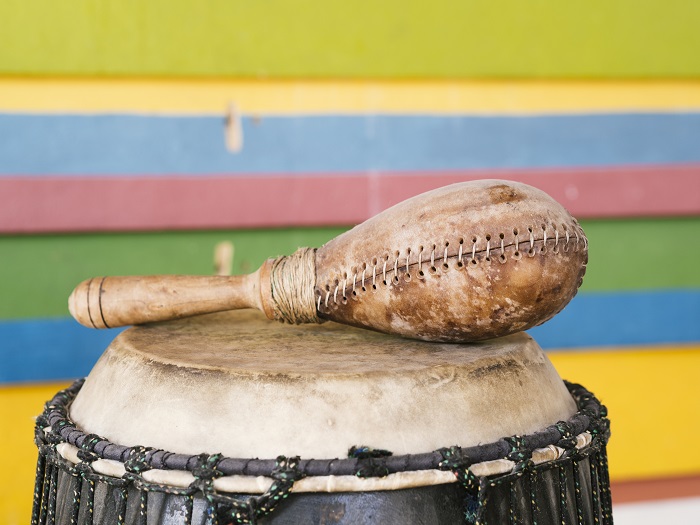African Native Music
African music is characterized by intricate rhythms and percussion sounds and harmonious bands, diverse and unique to each ethnicity. Vocal music typically features a singer and a responding band. Cultural influences, such as those from Arab culture, are evident in certain regions. Music permeates all aspects of African life, serving a variety of purposes: entertainment, dance, religious rituals, life events, healing, and more. Tasks such as drilling, grinding, and woodworking are accompanied by specific songs. In court, songs are sung to praise or criticize leaders and recount history. Special songs are also created for special occasions. In African customs, music holds a prominent role, such as announcing a death among the Basongye tribes in Zaire. Musicians and singers often serve as entertainers and clowns, providing emotional comfort.
Dance and languages in African music
African dance and music are central to African customs, celebrations, and occasions. Music and dance are closely linked, and dancers often sing or hold an idiophone instrument while performing.
African languages, being “audio languages,” have meanings that are determined by the speaker’s modulation. Music is utilized for communication, with drummers, horn players, and other musicians mimicking words and telling stories through rhythms and modulations. “Speaker drums,” capable of multiple modes, are commonly used for messaging. Storytelling is possible through the use of music alone by African musicians.

Music, being a social activity, is widely participated in Africa. It is usually played outdoors and is spontaneously created and performed. The lack of written ethnography in African folk culture and history, along with its oral tradition, results in music being verbatim transmitted. Rhythm and percussion, featuring drums and xylophones, are a prominent aspect in African music, reflecting the close relationship with dance.
The instruments used in percussion playing are chosen to contrast the acoustic modulus, and the musician often incorporates body percussion. African vocal music showcases a wide range of vocal sounds, including whispers, screams, and animal imitations, in the over-the-top performance style of “call and response.” Short phrases with changing words are also a characteristic of African vocal music. Despite a rich history, African music has been heavily influenced by American and European styles, leading to financial success but a reduction in authentic African music. Nevertheless, the fusion of African and Western styles has produced some interesting results.
African music styles
As many around the world believe that original music should be distinct from modern music, this is not the case in Africa.
In the following we are going to get a lot of African music about him and get to know him. Browse the different styles of African music and if you’re interested, I’ll introduce some of the most popular African songs.
Given that there are so many African styles of music, here are some of the most popular and special:
Soukous
Sucus is almost a style similar to Rumba. Renowned African singer Franco Lambo is one of the most celebrated artists in the genre; and has been practicing it for nearly five years. Due to the use of special rhythms, he is also called the guitar wizard.
Sucus music is originally for the Congo country and has some similarities to the Rumba style. Papa Wemba was another prominent musician of this genre who died in the 6th year. If you want to hear a famous song in this genre, be sure to listen to Papa Wemba’s Yolele.
Juju
This style was originally for the Nigerian country, and much of it was used in Western music. Subcategories like afrobeat and highlife find the same style of publishing.
Les Amazones d’Afrique, a group of women in this genre, have furthered their music content towards equality and equality with men. Its members include Benin, Mali, Nigeria and Guinea. The charm of this group is the variety of styles that are covered. I suggest you listen to Mansa Soyari’s song from this band.

MBALAX
A popular Senegalese style! Youssou N’Dour formed the band Super Etoiles for the first time in 6 years, becoming the most popular band in the genre.
We may also find this helpful:
Japanese music culture
Zilin
Zilyn is a very beautiful style with more focus on vocal and vocal techniques. Its roots are in Benin, and religion has had a profound effect on this style. African pop queen Angelique Kidjo uses many of Zilain’s techniques in her music and is often criticized for failing to maintain the authenticity of African music.
But the interesting thing about him was his extraordinary influence on African music. Kijo currently lives in New York, but says he occasionally returns to his home village of Avida to foster his spirituality. To get acquainted with this genre, I recommend Angolo’s song from this artist.
GNAWA
This style, also known as Ethno-Pop and Gnawi Blues, originates from the desert. This style is based on North African music and religious songs.
In terms of style of poetry and dance, the music retains its originality. When the siege of Timbuktu in Morocco in the 9th century and the language of Bambara became popular in the area, the emergence of this music began almost.
Also, the reason for using the Sintire or Gamber instrument in this style is for the above reasons. In Morocco, the style is also considered to be relatively popular music, and in the country’s cafes and music shops, many artists find it.
African music in Grammy 2019
Today, the progress of music in Africa has been so great that it four african music was nominated for Grammy music Awards 2019 in the Best World Music Album category. The nominees include the Soweto Gospel Choir (South Africa), Seun Kuti & Egypt 80 (Nigeria), Fatoumata Diawara (Mali) and Bombino (Niger). Among the nominees for the Grammy Award- “Soweto Gospel Choir” from South Africa Won the award for the album “Freedom”

